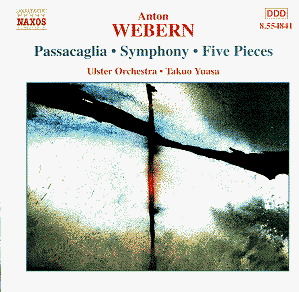Webern was born in Vienna and entered the university
there in 1902. Before he graduated, he began his collaboration with
Arnold Schoenberg, who continued to teach him privately until 1908.
His early works show the clear influence of the leading romantic composers
of the period: Brahms, Mahler and Strauss. However by the time he completed
his studies with Schoenberg, Webern was committed to a style which gave
precedence to atonality rather than the conventional major-minor key
system. His first atonal work, the Five Movements for String Quartet
(which is included here), appeared in 1909.
Webern developed a taste for serial composition, whereby
the twelve notes of the chromatic scale are treated strictly in sequence.
He was a perfectionist who sought the greatest economy in his music,
and he ascribed opus numbers to only thirty-one of his compositions,
most of which are well under ten minutes long. Yet he remains one of
the most important figures in 20th century music, who influenced many
composers, including (the later) Stravinsky, Pierre Boulez and Karlheinz
Stockhausen.
This enterprising Naxos discs covers many aspects of
Webern's output, in a most imaginative programme. The ambient recording
from the Ulster Hall does justice to the skilful playing of the resident
orchestra, under the talented direction of Takuo Yuasa. His previous
recordings for Naxos, in particular his highly successful Schoenberg
disc (8. 554371 review)
made a positive impression which has been confirmed here.
The early Passacaglia is in unequivocally romantic
in style, with rich-toned strings and arching expressive phrases, very
much the contemporary of Mahler who owed much to Brahms. But the other
works are more iconoclastic, however refined. Atonality leads to serialism,
the Opus 5 Pieces to the Symphony and Variations, and they all sound
sophisticated and finely judged. Yuasa achieves miracles of fine-toned
orchestral balance, which is the real priority when performing Webern.
For me the highlight is the most powerful of all these
pieces, the brief but overwhelmingly expressive funeral march from Opus
6; the increasing intensity of the crescendo carries all before it.
While the famous recordings by Karajan and the Berlin Philharmonic may
be more sophisticated still, Yuasa and the Ulster Orchestra are wholly
convincing and can take justifiable pride in their achievement. Full
marks too to Richard Whitehouse's thorough and perceptive insert notes,
which are a model of their kind. This disc can be confidently recommended.
Terry Barfoot


